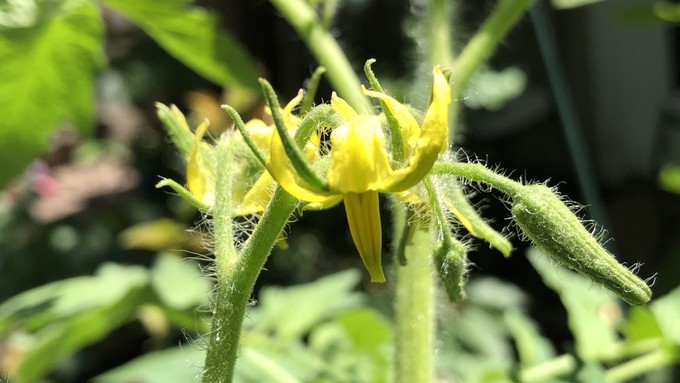
Master gardeners host Saturday sales in Woodland – plus an online garden chat

Tomato-growing season will begin soon, really! Anyone looking for heirloom tomato starts can check out the Yolo master gardener plant sales April 1 or April 8. Perennials will be on sale, too. Kathy Morrison
Got plants? Yolo County master gardeners do – including heirloom tomato seedlings ready for spring planting.
On two Saturdays – April 1 and 8 – find an excellent selection of tomato varieties plus drought-tolerant perennials at the Yolo County master gardeners’ Spring Plant Sales at Woodland Community College. Open from 9 a.m. to 1 p.m. both Saturdays, the sales will be held in the college’s shade house/greenhouse area (look for the signs).
These plants were lovingly nurtured by Yolo County master gardeners and are ready for planting (as soon as the rain stops). They’re priced to sell: Plants in 1-gallon pots are $6 each; $4.50 for plants in quart-size containers. Tomato plants are $3 apiece. Cash or check only.
Woodland Community College is located at 2300 E. Gibson Road, Woodland.
Wondering what to do in your April garden – and confused by all this rainy weather? Get some answers during a free Zoom workshop, also on Saturday, April 1, and offered by the Yolo County master gardeners. At 10 a.m., UCCE Yolo County Master Gardener Treva Valentine will share her “Kitchen Garden Chat,” part of a monthly online series open free to the public.
“April is the month of action,” say the master gardeners. “Drawing on her vast experience and amusing anecdotes about tending the edible garden, Treva will lead a discussion about what to be doing in the month of April in the edible garden, including growing veggies in containers and how to deal with springtime pests. As always, participants are encouraged to bring all of their edible garden questions to share.”
No advance registration is required. To tune into Treva, click this Zoom link: https://ucanr.zoom.us/j/98028723763.
“Kitchen Garden Chat” is held via Zoom at 10 a.m. the first Saturday of each month.
Details on the sales or workshop: https://yolomg.ucanr.edu/.
Comments
0 comments have been posted.Sacramento Digs Gardening to your inbox.
Food in My Back Yard Series
May 6: Maintain soil moisture with mulch for garden success
April 29: What's (already) wrong with my tomato plants?
April 22: Should you stock up on fertilizer? (Yes!)
April 15: Grow culinary herbs in containers
April 8: When to plant summer vegetables
April 1: Don't be fooled by these garden myths
March 25: Fertilizer tips: How to 'feed' your vegetables for healthy growth
March 18: Time to give vegetable seedlings some more space
March 11: Ways to win the fight against weeds
March 4: Potatoes from the garden
Feb. 25: Plant a fruit tree now -- for later
Feb. 18: How to squeeze more food into less space
Feb. 11: When to plant? Consider staggering your transplants
Feb. 4: Starting in seed starting
Sites We Like
Garden Checklist for week of May 11
Make the most of the lower temperatures early in the week. We’ll be back in the 80s by Thursday.
* Plant, plant, plant! It’s prime planting season in the Sacramento area. Time to set out those tomato transplants along with peppers and eggplants. Pinch off any flowers on new transplants to make them concentrate on establishing roots instead of setting premature fruit.
* Direct-seed melons, cucumbers, summer squash, corn, radishes, pumpkins and annual herbs such as basil.
* Harvest cabbage, lettuce, peas and green onions.
* In the flower garden, direct-seed sunflowers, cosmos, salvia, zinnias, marigolds, celosia and asters. (You also can transplant seedlings for many of the same flowers.)
* Plant dahlia tubers.
* Transplant petunias, marigolds and perennial flowers such as astilbe, columbine, coneflowers, coreopsis, dahlias, rudbeckia and verbena.
* Keep an eye out for slugs, snails, earwigs and aphids that want to dine on tender new growth.
* Feed summer bloomers with a balanced fertilizer.
* For continued bloom, cut off spent flowers on roses as well as other flowering plants.
* Add mulch to the garden to maintain moisture. Mulch also cuts down on weeds. But don’t let it mound around the stems or trunks of trees or shrubs. Leave about a 6-inch-to-1-foot circle to avoid crown rot or other problems.
* Remember to weed! Pull those nasties before they set seed.
* Water early in the day and keep seedlings evenly moist.